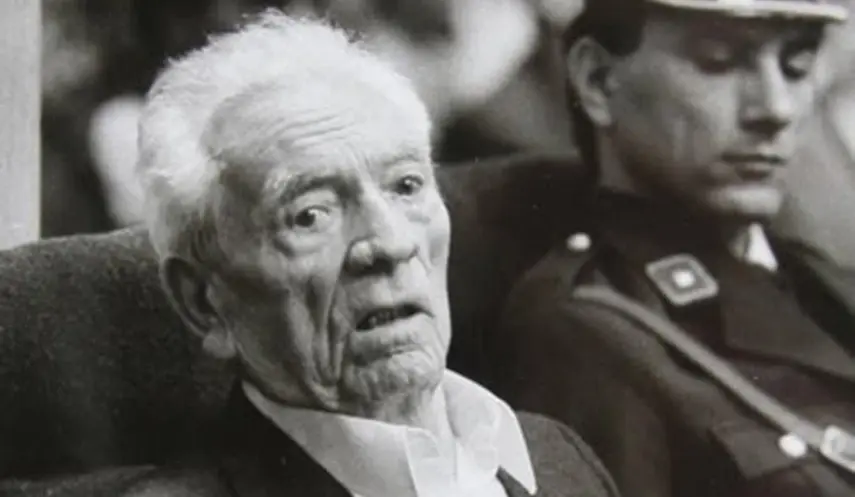ANDRIJA ARTUKOVIĆ - RIGHT-HAND MAN OF USTASHA LEADER PAVELIĆ
Region - war criminals - anniversary
11/13/2025
12:15

BIJELJINA, NOVEMBER 13 /SRNA/ - On November 14, 1984, the United States arrested Croatian war criminal Andrija Artuković, Minister of the Interior of the Independent State of Croatia /NDH/, who had been the right-hand man of the Ustasha leader Ante Pavelić.
Artuković was sentenced to death on May 14, 1986, but the sentence was never carried out, as he died in prison less than three years later.
At the time, the Yugoslav authorities tried him only for individual cases of murder, but not for the genocide against Serbs, Jews, and Roma - an approach still regarded as a farce and an attempt to conceal the true nature of Ustasha crimes in the name of "brotherhood and unity".
BENEFICIARY OF USTASHA "RATLINES"
Artuković arrived in the United States in 1948 under a false identity, having been transported via the so-called "ratlines," a network through which some Croatian Catholic dignitaries, in cooperation with the Vatican, helped Ustasha officials escape justice.
The U.S. authorities ignored Yugoslavia's extradition requests, which Artuković's family tried to block by claiming he suffered from Alzheimer’s disease.
His trial was the most significant of its kind in the former Yugoslavia, which had been pursuing him for exactly 40 years.
HE SENT PEOPLE TO JASENOVAC, ESTABLISHED CHILDREN'S CAMPS...
In May 1941, Artuković ordered his subordinates to arrest thousands of Serb civilians and murder them, including priests, children, women, and the elderly, as well as to burn and destroy entire settlements.
From April 1941 until the beginning of October 1942, he commanded that Serbs, Jews, Roma, and all political opponents be forcibly taken to and killed in concentration camps such as Jasenovac, Stara Gradiška, Đakovo, Lobor, Jastrebarsko, Uštica, and others.
Hundreds of thousands of people were killed in this manner, including 2,000 children murdered with poisonous gas in the Stara Gradiška concentration camp; thousands of other children in the camps were killed through starvation, the addition of caustic soda to their food, and other cruel methods.
In May 1942, systematic deportations of Roma civilians began from areas of present-day Croatia and BiH. More than 30,000 people from Osijek, Dalj, Županja, and other towns were sent to the Jasenovac camp by Artuković.
As the Ustasha Minister of the Interior, Artuković ordered the killing of civilians, particularly Serbs, as a form of reprisal, often targeting entire settlements. His "specialty" in destroying human lives included running people over with tanks.
CATHOLIC CLERGY TESTIFIED IN FAVOR OF A WAR CRIMINAL
Andrija Artuković faced his first possible extradition in 1958, as US authorities had evidence documenting numerous victims, mostly priests, women, and children. However, the prosecution was unable to secure the necessary witnesses.
At the same time, Catholic clergy testified in his favor, the first being Stjepan Lacković, the former secretary of Archbishop Alojzije Stepinac.
The second priest called as a witness for Artuković was Dragutin Kamber, who, like many other unprosecuted war criminals, was supposed to stand trial for the murder of more than 300 people in the Doboj area.
The third witness was Rene Herman, an émigré since 1949, a civil servant, who had been sentenced to an eighteen-month prison term in Yugoslavia.
They testified under oath before the U.S. authorities that Artuković was innocent.
In the mid-1970s, eleven US Congressmen wrote to then-Secretary of State Henry Kissinger, stating that "a sense of justice is violated by the fact that Andrija Artuković lives carefree in Southern California despite evidence that he was the `Croatian Eichmann`". However, this appeal had no effect.
Nevertheless, on February 4, 1985, a court in Los Angeles found Artuković guilty of the charges against him and deemed him suitable for extradition.
HE SPOKE WITH STEPINAC `AS IF WITH BROTHER`
Artuković admitted at his trial in Zagreb that, as the NDH Minister of the Interior, he had "a very good relationship with Archbishop Stepinac – like with a brother," and that Stepinac would tell him things which were then conveyed to Pavelić.
He also acknowledged that, by adopting the Ustashe ideology and the principles of the Ustashe regime, he embraced the doctrine "for a bitter wound – a bitter grass".
He stated that the cession of certain territories /such as Dalmatia/ to the Italians was a concession to the Italian Fascist leader Benito Mussolini in exchange for support for the Ustashe.
He claimed that the racial laws "partially existed in the NDH" and acknowledged being aware of cases of forced conversion of Serbs, but asserted that these were carried out by the Catholic clergy.
He confirmed that there were expulsions of Serbs /using the term "resettlement"/, which he justified as necessary to "cleanse the territory of the NDH".
Andrija Artuković was one of the few high-ranking Ustashe criminals who was held accountable, at least partially, for the horrific crimes in the NDH, crimes that, in present-day Croatia, many political and clerical circles attempt to deny.

SERBS IN TEARS AND FEAR OVER OWNERSHIP OF ORTHODOX CEMETERIES AND CHURCHES

CVIJANOVIĆ DEMANDS ACCOUNTABILITY FOR SHAMEFUL CONCERT IN ŠIROKI BRIJEG

OSTOJIĆ URGES BiH AND EU TO ACT OVER GLORIFICATION OF FASCIST IDEOLOGIES





